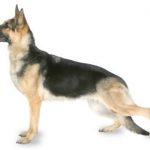GERMAN SHEPHERD DOG
The German Shepherd Dog is one of America’s most popular dog breeds — for good reason. He’s an intelligent and capable working dog. His devotion and courage are unmatched. And he’s amazingly versatile, excelling at most anything he’s trained to do: guide and assistance work for the handicapped, police and military service, herding, search and rescue, drug detection, competitive obedience and, last but not least, faithful companion.
-
The German Shepherd Dog, also known as the Alsatian in Great Britain and parts of Europe, is among the top 10 most popular dog breeds in the U.S., and probably one of the world’s most recognized breeds.
He owes part of his renown to a small puppy who was plucked from a bullet- and bomb-riddled breeding kennel in France during World War I by Corporal Lee Duncan. At the end of the war Duncan brought the puppy back to his hometown of Los Angeles, trained him, and turned him into one of the most famous dogs in show biz: Rin Tin Tin. Rin Tin Tin went on to appear in dozens of movies and, at the height of his stardom, got 10,000 fan letters a week.
The German Shepherd has held many jobs other than movie star: leading the blind, chasing down criminals, sniffing out illegal substances, serving in the military, visiting the sick, and herding stock are just some of the jobs held by this versatile breed.
The dog has even taken on the role of national hero. German Shepherds were the search and rescue dogs crawling through the ruins of the World Trade Center after the 9/11 terrorist attacks, looking for survivors and comforting rescue workers and families.
The German Shepherd may embody some of the best traits of dogs, but he’s not for everyone. Originally bred to herd flocks all day, this is a high-energy dog who needs a lot of activity and exercise. Without it, he’s likely to express his boredom and frustration in ways you don’t like, such as barking andchewing.
The breed also has an aloof and sometimes suspicious nature — great for a watchdog but not the sort of family dog who’ll make guests feel welcome. But if you expose a German Shepherd to many different situations and people starting in puppyhood, he can learn to take new people and circumstances in stride.
If you’re buying a puppy, you’ll get a slightly different kind of German Shepherd depending on whether you choose an American versus a German breeder. In general, American breeders are often aiming to create dog show champions, and they breed puppies more for that distinctive German Shepherd look than for those distinctive German Shepherd talents.
Fans say that American-bred German Shepherds are calmer than their German counterparts, but critics say these dogs have lost some of their talents for working traditional German Shepherd jobs, and are more prone to behavior problems such as separation anxiety.
German breeders, on the other hand, breed German Shepherds for their working abilities as well as to fit the breed’s traditional look. Before a German Shepherd is bred in Germany, he has to pass numerous tests to prove he measures up to the physical and mental benchmarks the breed is known for. German Shepherd Dogs from Germany tend to have a more energetic and driven personality.
-
Highlights
- German Shepherds isn’t the breed for you if you’re away from home frequently or for long periods of time. When left alone they can become anxious or bored, and are likely to express their worry in ways you don’t like — barking, chewing, and digging.
- The German Shepherd is an active and intelligent dog. He must be kept busy learning, playing, and working. Daily exercise, both physical (such as jogging and Frisbee) and mental (such as training sessions), is a must.
- German Shepherds can be aloof and suspicious of strangers. To raise a social and well-behaved dog, expose your German Shepherd puppy to many experiences, places, and people. Obedience training, beginning with puppy classes, is important for getting him used to other people and dogs, as well as teaching him basic canine manners.
- These dogs shed, shed, shed — in fact, their nickname is the “German shedder.” Brush him several times a week and buy a good vacuum. You’ll need it.
- Crate training is not only a wonderful way to housetrain a puppy, it helps teach him to be calm and happy when separated from his owner. This is especially important for the German Shepherd, who sometimes suffers separation anxiety, or extreme anxiety when left alone.
- He’s got a reputation for being a great watchdog — and he is — but the German Shepherd should never be chained or tethered just to stand guard. No dog should; it leads to frustration and aggression. The German Shepherd is happiest living indoors with the family, but with access to a large, fenced yard, where he can burn off some of his natural energy.
- To get a healthy dog, never buy a puppy from an irresponsible breeder, puppy mill, or pet store. Look for a reputable breeder who tests her breeding dogs to make sure they’re free of genetic diseases that they might pass onto the puppies, and that they have sound temperaments.
Read more at http://dogtime.com/dog-breeds/german-shepherd-dog#5DWAa5Q6ofd5xmYu.99
